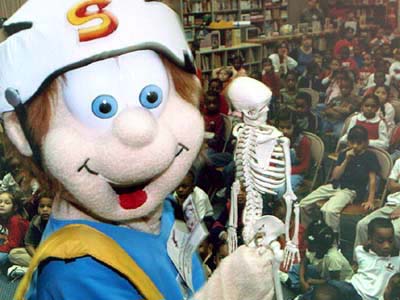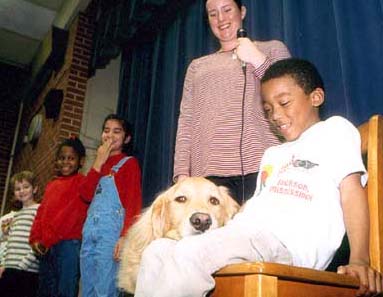JACKSON, Miss.—Over the past year more than 12,000 Mississippi school children have heard Methodist Rehabilitation Center’s injury prevention message.
That number grew when Think First, the Jackson hospital’s statewide safety and injury prevention program, was presented for the 50th time in the hospital’s two-story Atrium Mall on April 2. Fifty students from Spann Elementary School in Jackson were joined by firefighters, paramedics, police officers, physicians and Mississippi educators as the Think First team presented a program focusing on bike helmet and seat belt use.
“The response to Think First has been overwhelming,” said the program’s director Lauren Fairburn. “Firefighters and police officers from across the state have worked with our physicians and staff and Mississippi educators to encourage school children to always think first about safety and injury prevention.”
The program, which started last March, aims to prevent traumatic, often life-threatening injuries by focusing on fire, bicycle, automobile, firearm, boat, swimming and diving safety.
Think First speakers, including accident victims, physical therapists, paramedics and physicians, volunteer their time to encourage children to wear safety belts when driving, helmets when riding bicycles and motorcycles and to always think about what they’re doing before they get into any potentially dangerous situation.
“Kids are fascinated by our speakers,” said Fairburn. “They ask thoughtful questions and really pay attention to our message.”
One of those speakers, Josh Sharpe of Jackson who is paralyzed from the waist down, says it’s therapeutic to discuss his injury with children and teens. “I had been drinking and riding my motorcycle when I had my accident,” he said. “So for me to sit and talk to kids about it and show them why they need to think first before they do something stupid is really important to me. If I can prevent just one kid from winding up in a wheelchair or worse, then it’s all worth it.”
Think First programs vary according to the ages of the audience. Older students, for example, hear a more serious story often told by former Methodist Rehab patients who were injured in high school by either not wearing a seat belt, driving drunk or by making other careless decisions.
Michelle Jenkins of Brandon attended one of the first programs last April and said she took the message to heart. “I think Americans need to practice safe driving. I mean, you’ve got to at least wear a seat belt,” the then 17-year-old said. Jenkins said she sees her friends showing off in their cars all the time and worries about them. “It’s stupid. What’s the point of showing off your car if you’re going to wreck it? You’ve got to be smart and think about what you’re doing.”
The Think First team has visited Spann Elementary School in Jackson four times in the last year. “Think First has had a huge impact on our students from the very beginning,” said principal Darlene Harmon. “There was a noticeable difference in our students after their first program. They were more orderly on the playground and you could hear them talking about wearing helmets and seatbelts.
“We really enjoyed being a part of the 50th program.”
Spann is the first Mississippi school to receive Methodist Rehab’s first Think First Safety Award for their participation in and commitment to the hospital’s injury prevention program.
One of the most popular parts of Think First has been its mascot, Sammy Safety. A certified safety superhero, Sammy works with Fairburn and others on the Think First team. Whether dancing across the stage in his size 18 shoes, demonstrating the proper way to wear a bike helmet or showing kids how to stop, drop and roll if caught on fire, Sammy makes learning about safety a fun and memorable experience, said Jim Albritton, public relations director at Methodist Rehab.
“Auditoriums can get pretty loud when he enters,” Albritton said. “Children who weren’t paying much attention before really sit up and take notice when they see Sammy. And you can’t help but smile when you see him dance across the stage to an N’Sync song.”
Think First is designed to entertain and inform children, said Mark Adams, Methodist Rehab president and CEO. “The speakers, the mascot and all the other elements give students a chance to see how important it is to prevent traumatic injuries. And the response from educators has been wonderful. We couldn’t be more pleased with the results.”
Shortly after the Think First got on its feet, Methodist Rehab staff teamed up with the Madison Sheriff’s Department at Madison Avenue Elementary School for the first Sammy Safety Seatbelt Patrol last September.
“The seatbelt patrol really got the attention of the students and parents,” said Jamie McCullough, a counselor at the school. “They offered lifesavers to kids who were buckled up, dum-dums to those unrestrained and police officers gave out information to parents about how seatbelts can save lives.”
Over the last year, Think First has also focused on fire, boating, swimming and diving safety as well as on severe weather and back to school safety.
Each year an estimated 500,000 people sustain brain and spinal cord injuries in the United States. The most frequent causes of these injuries are automobile crashes, falls, athletic injuries, especially diving, and violence. Children and teens are at high-risk for these devastating injuries, many of which are preventable.
“That’s the important thing,” said Fairburn. “Most all of these injuries don’t have to happen. If we can educate children and teens about avoiding traumatic injuries, then hopefully, we won’t have to see them here at the hospital learning how to be independent in a wheelchair.
“It’s all about prevention.”


